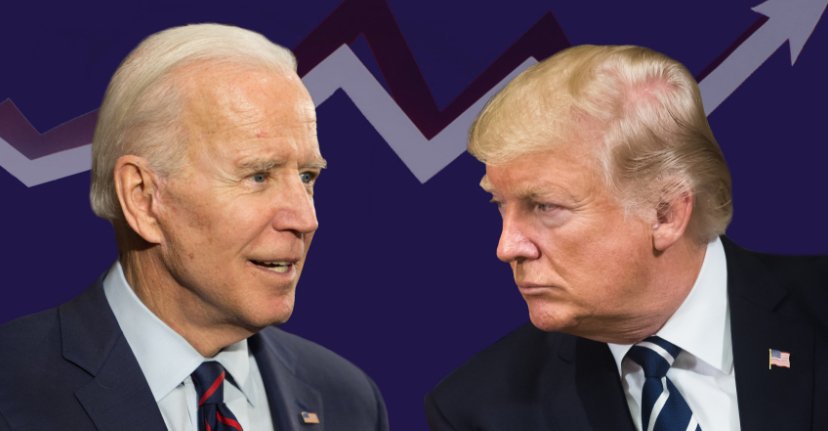Election 2020: Market Outlook
To say that President Donald Trump and former Vice President Joe Biden have divergent plans for America is putting it mildly. As the election inches closer, investors are considering what impacts proposed policies may have on the financial markets.
Yet whichever way the presidential election goes, it is important to remember that the president alone does not decide which policies become law. That is the job of Congress—and very little can get done in Washington without the support of both chambers of Congress. When Congress can’t agree, the so-called “political gridlock” has historically been a positive for the stock market. Investors view gridlock as an indicator of the status quo, since the likelihood of the passage of any substantial laws that would be an existential threat to a given industry is lowered. So as investors consider policy proposals, it is equally as important to consider the congressional dynamic that might be in place.
Of course, policy and legislation alone don’t drive the market, and they certainly don’t account for external factors that may influence the market, such as Covid-19 surges or the potential for a contested election.
Here, seven ways the market may be affected—and the potential implications for investors. (To be clear, SoFi does not have a political position. What follows is meant for informational purposes only.)

Market Considerations: Covid-19
There is COVID-19’s impact on the voter psyche, and then there is COVID-19’s impact on the election process itself.
The number of mail-in and absentee ballots this year will far exceed historical averages, and counting these ballots will be time-consuming and may extend beyond Election Day in many states. Therefore, there may be no clear winner on November 3rd or even for days or weeks after Election Day. Markets do not like uncertainty, and if there is no clear winner on Election Day, it’s a good bet that the stock market will experience some short-term volatility.
Hopes of a V-shaped economic recovery have largely been replaced by fears of a K-shaped recovery, in which the recovery from the crisis takes two sharply divergent paths, significantly widening wealth and income inequality. This is highlighted by the fact that the stock market is back to record highs while the US economy is still deep in recession and only about half of Americans own stocks. The remedy to a K-shaped recovery could take many forms and could very well include changes to the tax code.
Market Considerations: Tax Policies
For investors, the possibility of additional tax cuts for US business and consumers may raise profit expectations for publicly traded companies while simultaneously acting as a headwind for US treasury bonds, which rely on taxes to fulfill interest payments.
The possibility of a hike in the corporate tax rate may cause investors to revise forward earnings forecasts, which could directly impact key valuation metrics such as the forward price-to-earnings ratio.
Market Considerations: Climate Change
If the US rejoins the Paris Climate Accord, there would be a renewed focus on cutting domestic emissions. This could be a boost for clean energy stocks (solar, wind, hydropower), but could create significant headwinds for traditional energy companies and their suppliers (coal, oil, natural gas).
Market Considerations: Healthcare
Both dismantling the Affordable Care Act and expanding it have been proposed. Prescription drug price and healthcare coverage reforms have generally been seen as potential negatives for companies in the sector. It should be noted that healthcare stocks are generally more volatile than the broader market around presidential elections. For example, in 2016, the healthcare sector fell 6.6% in October compared to a 1.9% drop for the overall S&P 500. However, historical volatility does not imply it will happen in the future.
Market Considerations: Financials
Some Dodd-Frank-era financial reforms could be reinstated. As a result, possible antitrust reviews could create a headwind for mergers and acquisition advisors (predominantly investment banks). In addition, a proposal to make public colleges and universities free for individuals whose families make under $125,000 a year could mean a reduction in student loan originations, which could reduce future profit expectations among regional banks.
Market Considerations: Technology
Technology stocks face bipartisan support for additional oversight and regulation. To boot, a 16-month bipartisan investigation recently culminated with the House proposing a massive overhaul of US laws that could make it easier to break up giant tech companies. At the same time, an antitrust lawsuit has been launched against Google. It is unlikely that the outcome of the presidential election changes this trajectory.
Investors are Watching and Waiting, But Change Takes Time
Regardless of which side of the aisle investors are on, many are considering how differing policies may affect the market. But the election is not taking place in a vacuum. House and Senate elections will also affect the makeup of Congress and may determine the likelihood as to which policies get implemented. Real-time events, such as the Covid-19 crisis, as well as constituent demands also dictate the urgency as to which policies are implemented and discussed first.
Paying attention to policy, differentiation, and plans for the future can help investors keep track of events that are most important to them. Understanding key government policy discussions can also give shareholders direction in terms of making sure that the companies they invest in are focused on key issues as the government continues to shape policy.
SoFi Invest®
The information provided is not meant to provide investment or financial advice. Investment decisions should be based on an individual’s specific financial needs, goals and risk profile. SoFi can’t guarantee future financial performance. Advisory services offered through SoFi Wealth, LLC. SoFi Securities, LLC, member FINRA / SIPC .
External Websites: The information and analysis provided through hyperlinks to third-party websites, while believed to be accurate, cannot be guaranteed by SoFi. Links are provided for informational purposes and should not be viewed as an endorsement.
SOIN20237



